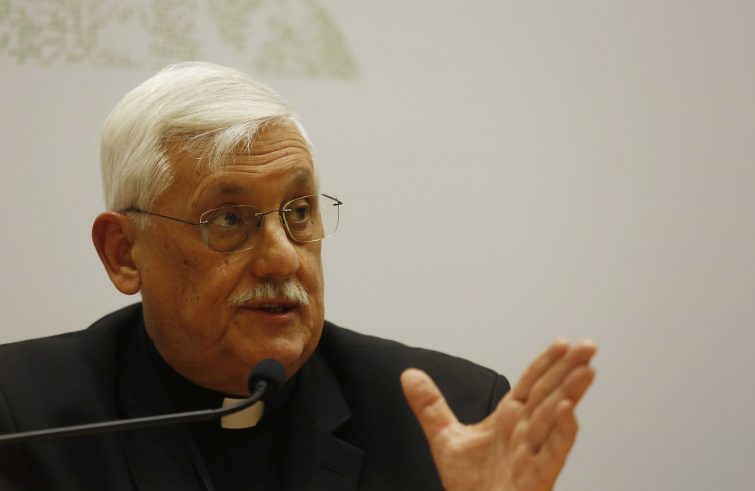
“Democracy can fall victim to the pandemic unless we seize this opportunity to foster civic awareness, collective and effective pursuit of the Common Good departing from the self-interests of individuals, groups, social categories or nations in order to tune into the greatest possible good for the whole of humanity, giving priority to the weakest members of society in taking complex decisions.” Father Arturo Sosa Abascal is the 30th successor of St. Ignatius of Loyola at the helm of the Society of Jesus. Since 2018 he also serves as President of the Union of Superiors General ( USG).
On several occasions you pointed out that democracy could become a victim of the pandemic.
Democracy has been deeply imperilled over the past years by declining civic awareness in societies that used to enjoy it, and by scant efforts to promote it in others. The rapid spread of various forms of populism and fundamentalism imbued with “religious” ideologies or distortions, have caused this erosion.
In many nations, the pandemic has become a pretext to exacerbate governments’ authoritarian attitudes and halt the democratic nature of decision-making processes.
What is your position with respect to accessing the upcoming vaccine distribution?
The distribution of the vaccine will be a litmus test of the aspirations for a social justice and social responsibility that truly cares for the weakest members of society. It will be testament to the genuine democratic resolve of nation States and international institutions such as the European Union. Vaccine production and distribution methods will give a clear sign of the post-Covid world. Will a market-driven rationale and its advantages prevail, or will there be room for the principles of social justice? Will it serve to somewhat bridge social rifts or will it amplify them? Will it be used as an opportunity for engaging in “a better kind of politics” called for by Pope Francis in Fratelli tutti, which genuinely pursues the Common Good?
For the past ten months the whole world has been confronted with a pandemic that caused nearly one and a half million deaths so far. How are men and women religious coping with this situation?
In the first place, like everyone else, religious or otherwise, we were taken aback by the pandemic, by its spread and its aggressiveness. Its impact on our lives was such that while it forced us to overcome the shock, fear and distress for ourselves, for our families, for the people for whom we carry out our ministry, it also disrupted all plans of apostolic activity and ordinary community life.
What happened reminded us of our fragility and prompted us to return to drink from the well of life-giving water of our charisms, to what gives meaning and substance to our lives.
It was also an opportunity to rediscover our fellow others and next-door neighbours. Congregations shared more time together, found different ways to come together in prayer prayed and opened their eyes to the reality around them, discovering the human richness of living together and the context in which they live.
Many congregations are actively engaged in healthcare service, while others have had to rethink their mission. Has the impact of the Coronavirus been strong?
An enormous effort was made to adapt our apostolic service to the circumstances imposed by the pandemic. We devoted extensive efforts to creativity in every area so as to carry on with our educational, pastoral work and other sectors which religious congregations are involved in. We did not withdraw into ourselves or merely protect ourselves… A huge number and variety of initiatives developed to “lend a helping hand” to those most affected by the circumstances caused by the pandemic. Despite our limitations, we equally embraced reflections on our experience, focusing on how we could contribute to societal transformation.
How many members of the clergy were killed by COVID-19 throughout the world?
Many, far too many…as throughout civil society as a whole. The most vulnerable because of their age, health or living conditions. I don’t know the exact numbers because we have no detailed reports, but above all because the pandemic and its consequences are not over.
Could the ongoing crisis be a propitious time for consecrated life, also in terms of vocations?
I don’t think it is possible to draw a connection between the pandemic crisis and an increase in vocations. Vocations depend on a number of other factors, including how consistent our lives are with the charism we seek to incarnate in order to grow into an attractive “model” of life for young people today.
Let us pray with faith and hope that the Lord will send out labourers into his harvest. It’s the Lord’s calling.
Our role is to help people perceive this calling and accompany the process of vocational discernment of those who perceive it. We are more concerned with the quality of vocations than with their quantity. We need consecrated persons of value. If there are many, it is surely better.
Since the last USG mid-year Assembly, there has been a growing yearning for a synodal experience of consecrated life based on Pope Francis’ proposal to the whole Church.
We firmly believe that by experiencing synodality in our lives we can more effectively contribute to the synodal Church envisioned by the Second Vatican Council, a dream that Pope Francis lives with intensity and wishes to share with all the People of God who are walking in the footsteps of our Lord Jesus.












